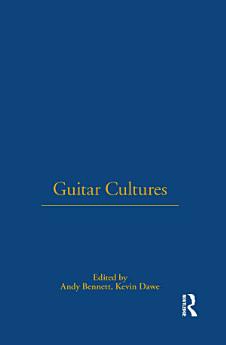Guitar Cultures
Andy Bennett · Kevin Dawe
মে’ ২০২০ · Routledge
ইবুক
224
পৃষ্ঠা
family_home
যোগ্য
info
reportমূল্যাংকন আৰু পৰ্যালোচনা সত্যাপন কৰা হোৱা নাই অধিক জানক
এই ইবুকখনৰ বিষয়ে
The guitar is one of the most evocative instruments in the world. It features in music as diverse as heavy metal, blues, indie and flamenco, as well as Indian classical music, village music making in Papua New Guinea and carnival in Brazil. This cross-cultural popularity makes it a unique starting point for understanding social interaction and cultural identity. Guitar music can be sexy, soothing, melancholy or manic, but it nearly always brings people together and creates a common ground even if this common ground is often the site of intense social, cultural, economic and political negotiation and contest.This book explores how people use guitars and guitar music in various nations across the world as a musical and symbolic basis for creating identities. In a world where place and space are challenged by the pace of globalization, the guitar provides images, sounds and styles that help define new cultural territories. Guitars play a crucial part in shaping the commercial music industry, educational music programmes, and local community atmosphere. Live or recorded, guitar music and performance, collecting and manufacture sustains a network of varied social exchanges that constitute a distinct cultural milieu.Representing the first sustained analysis of what the guitar means to artists and audiences world-wide, this book demonstrates that this seemingly simple material artefact resonates with meaning as well as music.
লিখকৰ বিষয়ে
Andy Bennett Lecturer in Sociology,University of Surrey Kevin Dawe Lecturer, School of Music, University of Leeds
এই ইবুকখনক মূল্যাংকন কৰক
আমাক আপোনাৰ মতামত জনাওক।
পঢ়াৰ নির্দেশাৱলী
স্মাৰ্টফ’ন আৰু টেবলেট
Android আৰু iPad/iPhoneৰ বাবে Google Play Books এপটো ইনষ্টল কৰক। ই স্বয়ংক্রিয়ভাৱে আপোনাৰ একাউণ্টৰ সৈতে ছিংক হয় আৰু আপুনি য'তে নাথাকক ত'তেই কোনো অডিঅ'বুক অনলাইন বা অফলাইনত শুনিবলৈ সুবিধা দিয়ে।
লেপটপ আৰু কম্পিউটাৰ
আপুনি কম্পিউটাৰৰ ৱেব ব্রাউজাৰ ব্যৱহাৰ কৰি Google Playত কিনা অডিঅ'বুকসমূহ শুনিব পাৰে।
ই-ৰীডাৰ আৰু অন্য ডিভাইচ
Kobo eReadersৰ দৰে ই-চিয়াঁহীৰ ডিভাইচসমূহত পঢ়িবলৈ, আপুনি এটা ফাইল ডাউনল’ড কৰি সেইটো আপোনাৰ ডিভাইচলৈ স্থানান্তৰণ কৰিব লাগিব। সমৰ্থিত ই-ৰিডাৰলৈ ফাইলটো কেনেকৈ স্থানান্তৰ কৰিব জানিবলৈ সহায় কেন্দ্ৰত থকা সবিশেষ নিৰ্দেশাৱলী চাওক।








